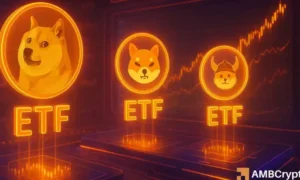The Future of Ethereum: Why It Could Surpass Bitcoin
Introduction
Joe Lubin, the co-founder of Ethereum and CEO of ConsenSys, recently expressed his belief that Ethereum (ETH) may one day prove to be more valuable than Bitcoin (BTC). In a recent appearance on Rug Radio’s FOMO Hour podcast, Lubin highlighted Ethereum’s unique utility as a foundational element in the evolution of the global financial system. As institutional interest grows, the landscape of digital currencies is shifting, and Ethereum stands to benefit from its versatile applications and the financial infrastructure being developed around it.
Institutional Adoption of Ethereum
Lubin’s insights come against the backdrop of ConsenSys’s significant investment initiatives, including a notable $425 million private investment into SharpLink Gaming, a publicly listed company focused on online gaming products. This investment will help create an Ethereum-denominated treasury for SharpLink, which marks a pioneering approach among public companies. Rather than merely accumulating Bitcoin, SharpLink plans to actively utilize ETH through mechanisms such as staking and decentralized finance (DeFi) strategies at prudent risk levels. This shift signals a growing recognition of Ethereum’s potential among institutional players.
The Role of Sovereign Wealth Funds
ConsenSys is reportedly in discussions with major banks and sovereign wealth funds in a prominent country to build infrastructure for the Ethereum ecosystem. These talks focus on developing both layer-1 and customized layer-2 solutions tailored to institutional needs. Lubin emphasizes that Ethereum is uniquely fitted to become the backbone of the next-generation financial system, particularly as institutions increasingly pivot toward blockchain technology. As sovereign funds begin to explore Ethereum for constructing financial frameworks, they may indeed catalyze a broader adoption trajectory.
Ethereum’s Distinct Position
Despite Ethereum facing challenges and underperformance compared to Bitcoin and emerging competitors like Solana (SOL), Lubin maintains that Ethereum is dedicated to long-term sustainability and infrastructure development. Unlike the short-lived narratives that tend to dominate crypto discussions, Ethereum is methodically laying the groundwork for scalable decentralized finance applications. With sovereign funds’ interest in Ethereum, there’s increasing potential for governments to incorporate Ethereum into their technological landscape, which could reshape the competitive dynamics of digital currencies.
Trust and Utility as Key Factors
Lubin argues that Ethereum’s true value lies not merely in its market price but in its standing as the world’s most trusted programmable asset. As trust, utility, and capital converge, the idea of Ether surpassing Bitcoin in value becomes increasingly plausible. Ethereum’s broad utility encompasses various functions, including staking, restaking, and executing smart contracts, positioning it favorably as institutions transition toward blockchain-focused infrastructures.
Conclusion
The conversation surrounding Ethereum is evolving, moving from a tech-centric discussion to one that encompasses a vision for the future of finance. Lubin’s assertions reflect growing optimism about Ethereum’s potential to lead in institutional applications and infrastructure development. As Ethereum garners institutional momentum, its unique value proposition may enable it to not only compete with but possibly surpass Bitcoin’s long-held dominance. As we look ahead, Ethereum’s trajectory will be closely watched, heralding a new era for digital currencies and financial systems alike.

















